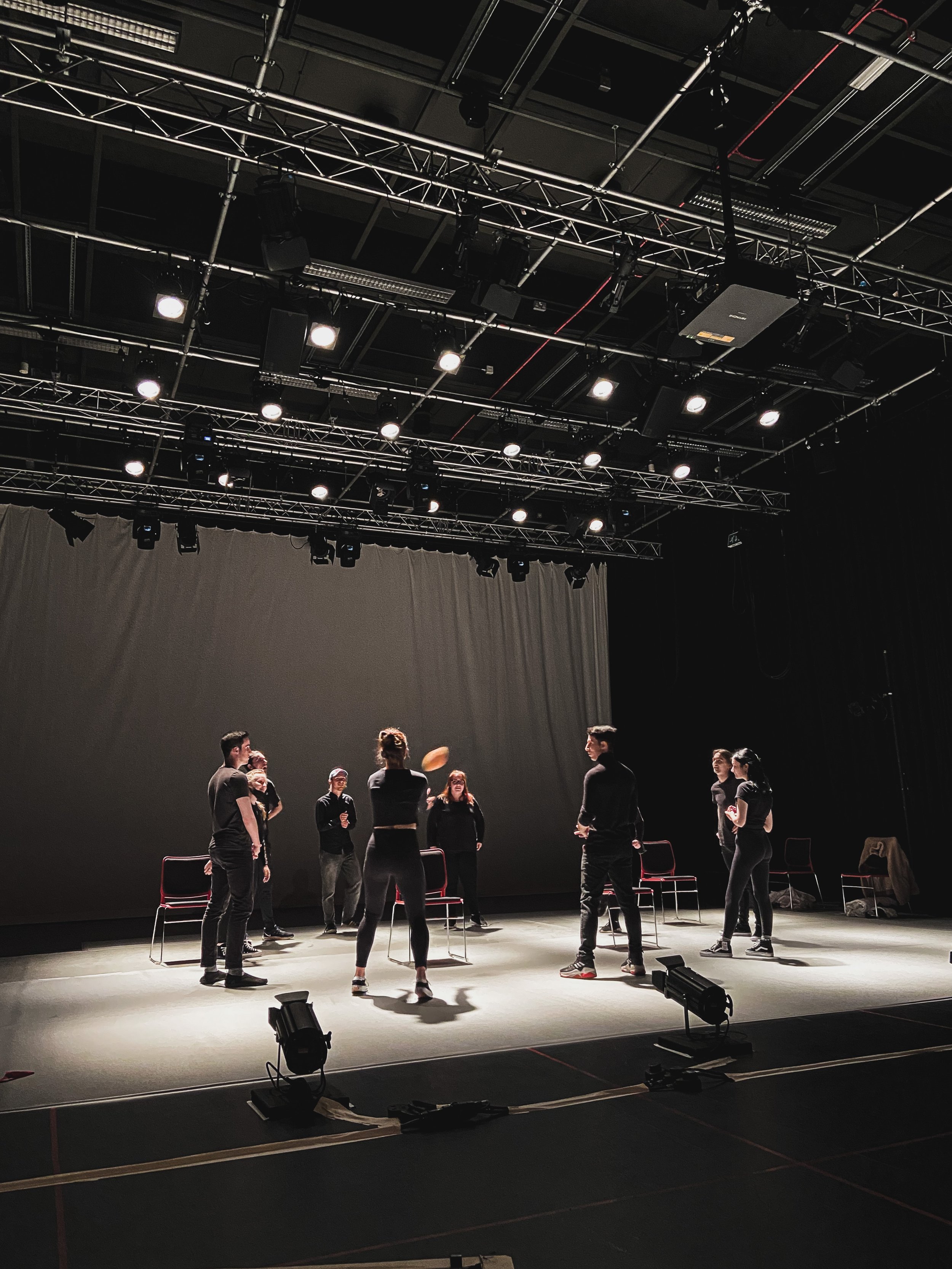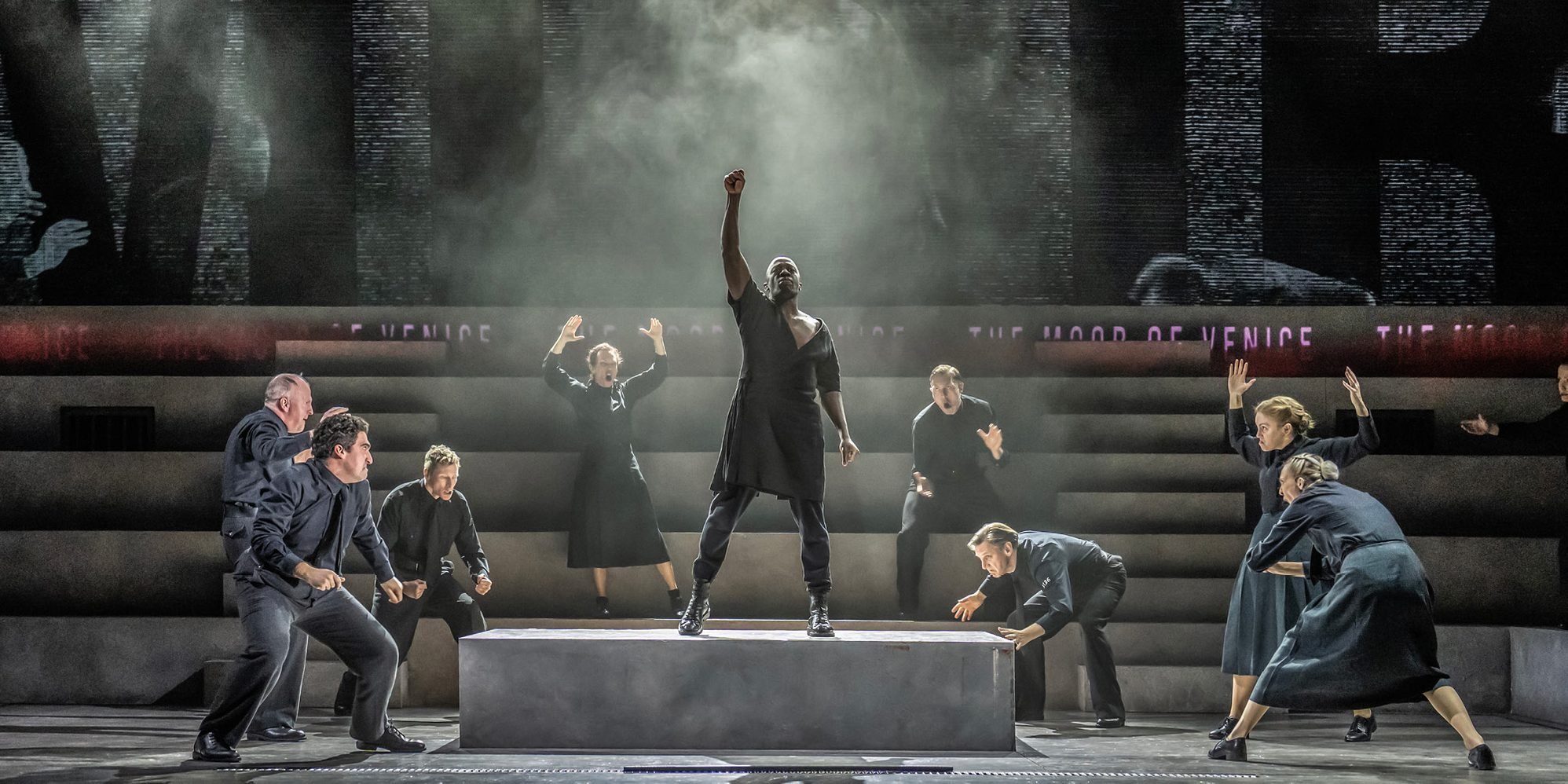The Inaccessibility of the Theatre Industry
Theatre as an art form is incredibly powerful. Not only can it provide a means of escape, but it can also be a hugely effective learning tool that can spark real change in society. Theatre is reactive to society. Society is reactive to the theatre.
The theatre as an industry also employs and provides for a vast pool of people. From actors to producers to lighting designers to individual audience members.
Currently, the theatre industry is simply not accessible for almost one in four of us in the UK who identify as disabled.
A group of people dressed in black, stood on a black stage facing each other in a circle. An orange ball is mid-motion in the centre of the group, as if it's being thrown between them. Some of the people are smiling while some concentrate on the ball.
“Theatre is reactive to society. Society is reactive to the theatre.”
Only 3 in 10 UK theatres list one or more access services for an upcoming production (audio description, BSL performances, captioning, dementia-friendly and relaxed performances), which means that 7 out of 10 shows can't be accessed by certain disabled audiences. 7 out of 10 shows are missing out on the custom of a community with a spending power of £274 billion a year.
With the 3 in 10 shows that do offer an access service, they can often happen just once or twice in a whole run of a show.
The National Theatre's run of Shakespeare's Othello (which ran from November 2022 to January 2023) had 62 performances in total. Of those 62 performances, there were 2 captioned performances, 2 audio-described performances with a touch tour, 1 BSL-interpreted performance and 1 relaxed performance. That's 6 shows in total that provided an access service.
If someone with a visual impairment wanted to go to this production of Othello, they could only go on 21st December at 2pm, or 14th January at 2pm.
Separating disabled theatre-goers from non-disabled theatre-goers, and furthermore limiting the amount of theatre disabled theatre-goers can consume, fuels a segregated industry. It's a similar argument for a venue having its accessible entrance separate from its 'main' entrance (with the accessible one usually tucked away at the back of the building, usually by the bins). What sort of message is this sending to disabled people?
If that same person with a visual impairment couldn't make it on 21st December at 2 pm, or 14th January at 2 pm, they simply never will experience the NT's production of Othello.
Often, the shows that do offer an access service aren't even given the same creative attention as the 'main' version of the show, which adds to this idea that theatre isn't for disabled people.
At Leeds Playhouse's Symposium event Access Shouldn't be an Afterthought in 2022, visually impaired actor and director Ben Wilson said "There is a vast amount of directors who haven't even listened to their own show's audio description. [...] The most disabled I ever feel is at the theatre, and I find that heartbreaking". Ben recently received a commendation at the National Theatre and Sunday Times' Ian Charleson awards for his role in Sheffield Theatres and Ramps on the Moon’s production of Much Ado About Nothing, of which very performance featured the use of integrated creative sign language, audio description and captioning.
A 2021 report on Theatre Access by VocalEyes states "The onus should not be on disabled people. If we are to live up to the values enshrined in the Equality Act, it should be the urgent collective duty of everyone working in the arts and creative industries to take ownership of embedding and enforcing the social justice that it represents".
"[Theatre organisations'] duty is ‘anticipatory’: they cannot wait until a disabled person wants to use the service, but must think in advance and on an ongoing basis about what disabled people with a range of access requirements might need. However, frequently, it still falls to disabled people and their organisations to proactively ensure access is available, identify gaps and problems, and suggest solutions to these, in order to experience theatre."
Also speaking at Leeds Playhouse's event was producer Paul Wilshaw, who said "It's not the duty of deaf and disabled people to justify their own rights. It's exhausting. You should feel heard and safe in theatres and should enjoy being there. Too many theatres are not accessible and it's very boring facing the same barriers day in and day out".
Paul's words ring all too true. Too long have disabled people been the ones to point out the barriers, to ask for things to be put in place in order for them to access what non-disabled people can with no questions asked.
"It's not the duty of deaf and disabled people to justify their own rights. It's exhausting.”
While the industry has a long way to go, there are some wins to be noted. Ben is currently the Audio Description Director for the Royal Shakespeare’s Company’s upcoming Midsummer Night's Dream. This is the first time the RSC will have audio description available on every performance, performed in character by the cast, from press night onwards. @sohoplace’s As You Like It (2022) which starred Rose Ayling-Ellis (EastEnders, Strictly Come Dancing 2021 winner) told Shakespeare’s story through integrated BSL and creative captioning.
A plain black background. On the right, actor Rose Ayling-Ellis is stood smiling and signing to another actor on the left. Rose is a white woman in her late twenties with straight long blonde hair. She is wearing a brown suede jacket with puffed shoulders, and light purple trousers. The actor on the left is a black person in their twenties with short black hair. They’re wearing a blue and white striped shirt with a green waist cost, and a brown/green cardigan which has fallen off their shoulders and is draped on their elbows.
It's time for theatre organisations, large and small, to follow in the footsteps of organisations like the RSC and @sohoplace. They need to take accountability for their lack of value for their disabled customers and take real action on what can be done to fix the wider issue at hand.
Speak to and work with disabled artists (check out our Career Spotlights with Bryony Moss and Sol Woodroffe), learn from the theatre creatives paving the way with integrated access (such as Amy Leach, Robert Hastie, and Caroline Parker MBE to name a few), and be ready to completely rethink your approach to theatre making (have you downloaded our Accessibility Rider Template?).
If you're going digital, make sure your live-streams and recordings have accessible features. As VocalEyes' report states "Streaming to ‘global audiences’ is simply exclusion by other means without audio description, subtitling and other accessibility and inclusive design measures".
This same report found that for 47% of people who went to the theatre from 2019 to 2020, over half of the online theatre that they came across was inaccessible to them. For those for whom audio description is important, 2 out of 3 people said that over half of the online theatre that they came across was inaccessible to them.
“Access shouldn't be an afterthought. Access should be there from the get-go.”
The theatre industry's pervasive inaccessibility, with 7 out of 10 shows lacking essential access services, excludes almost one in four disabled people in the UK. This segregation perpetuates a cycle of exclusion, limiting disabled theatre-goers to a fraction of a production's run.
The disparity in creative attention between accessible and mainstream shows reinforces the misguided notion that theatre is not equally for everyone. It is crucial for theatre organisations to embrace their anticipatory duty outlined in the Equality Act, prioritising accessibility from the outset. This paradigm shift is essential to ensure that theatre becomes a truly inclusive and transformative experience for all.
Access shouldn't be an afterthought. Access should be there from the get-go.
If you’d like to discuss creating more accessible art, SIC runs a number of workshops with theatre companies, fringe festivals, and arts organisations. We can cover subjects including disability, neurodiversity, creative access, and accessibility in inaccessible venues.
Want to have a chat? Book a call with our CEO Alice Hargreaves here.



